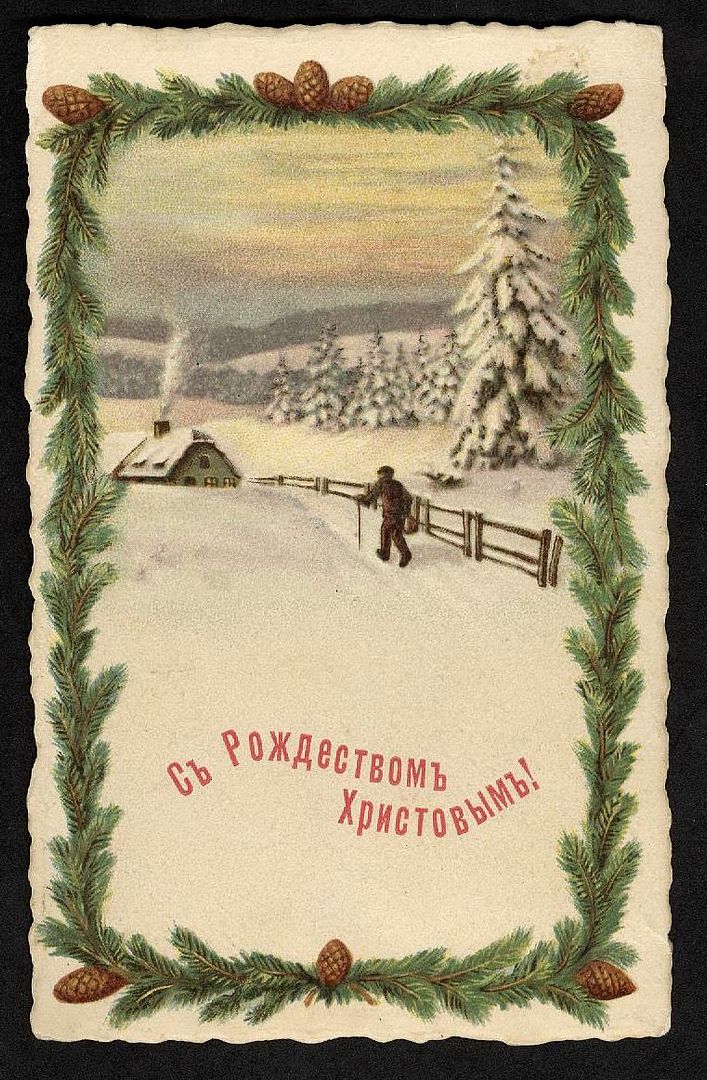 |
| Christmas Greeting in Russian Language sent to a Swedish Baptist Missionary in Manchuria, China. |
Manufacture: BNK
(who knows about this company?)
This blog post article offered by Mary Katherine May of QualityMusicandBooks.com.
Sometimes a postcard comes your way that sparks great intrigue, and this is one such postcard. Let's take a look with what we have to work with.
1. A man walking at a good pace over snow-covered ground toward a cheery looking cottage with smoking from the wafting into the wind.
2. Well-shaped fir trees blanketed in white.
3. A distant horizon under a soft, glowing sky that adds expanse to the small illustration.
4. The first hint of the holiday is found in the garland scattered with pine cones bordering the scalloped, rough edges of the card. They look blue-green in color to me--spruce, perhaps?
5. A Christmas greeting in the Russian language printed in red, and now the two traditional colors are present.
Truly, an International Postcard
Turning the card over--and this is SO exciting--is the message written in Swedish. Trying a translation tool won't help because I can't make out what it says except for God Jul 1923, and the signers, Ellen and Erik Persson.
But wait! There is more! The postcard is addressed to Rev. A. Lindstedt, P.O. Box 2 (New Town), Harbin, Manchuria, China.
Russia, Sweden, China: It All Comes Together
There is not a great wealth of information on the internet about Rev. Lindstedt, yet what is available offers an amount sufficient to understand what a brave undertaking the Reverend and his family did through the strength and grace of God.
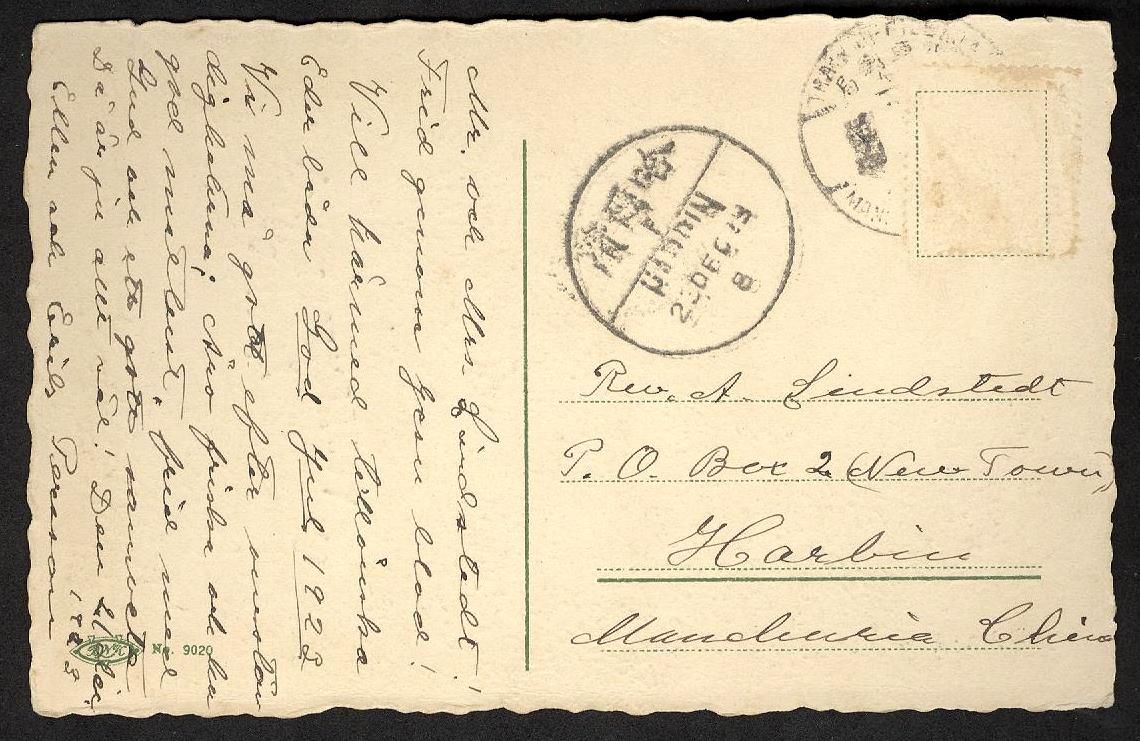 |
| Message to Rev. August Lindstedt from Ellen and Erik Persson, mailed to Manchuria, China Unfortunately for us, we can see that the postage stamp has been removed. |
August Lindstedt and his family served as missionaries of
the Swedish Baptist General Conference in Vladivostok from 1916 to 1917, and
among Russians in north China and Manchuria from 1917 to 1946. In the early
1920s Conference assumed control of the Chicago-based Swedish Baptist Foreign
Mission Society brought to culmination agitation - and practical efforts that
had extended over more than three decades. Earlier grassroots support through
the Nya WeckoPosten thus became recognized support of the Lindstedt family in
Siberia and China.
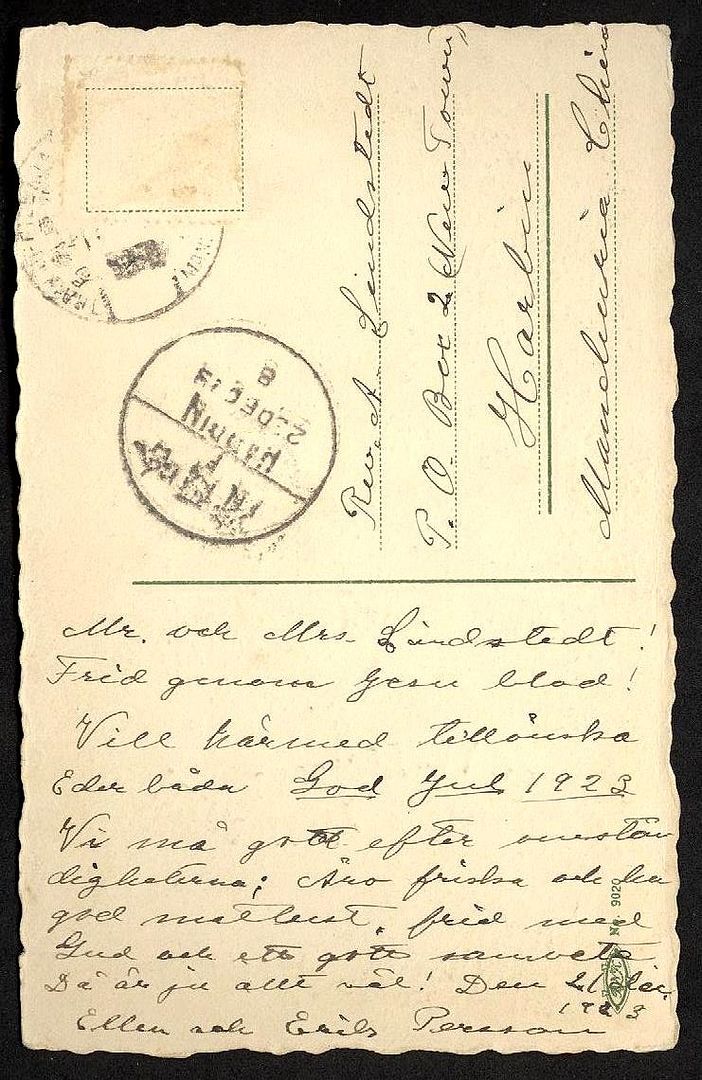 |
| God Jul 1923 from Ellen and Erik Persson to Mr. and Mrs. Lindstedt. |
Rev. August's son, Marvin offers a short, well-written article on the work of the Swedish Baptists in China in an edition of Trail Markers, a Bethel University publication. I quote a brief passage here:
E. W. Olson was an East Coast Conference pastor who had once
been to Siberia and wanted to return as a missionary to the Russians. Olson had
friends in Sweden, and traveled there to try to stir up interest and financial
support for the work he envisioned. In Sweden, Olson met and recruited August
Lindstedt, a young Christian who believed that God wanted him to preach the
good news of salvation to Russians.
Update Reports in the U.S.A.
When missionaries to foreign countries are here in the U.S. on sabbatical or other reasons, they frequently give talks at church functions to report on their progress and help raise money for their work. Contributing to the support of missionary work is a way for all Christians to be a part of Jesus Christ's Great Commandment in Matthew 28:19-20.
Here is a newspaper clipping announcing an upcoming talk by Rev. Lindstedt from the Southtown Economist, Southtown, Chicago, Illinois, October 23, 1938.
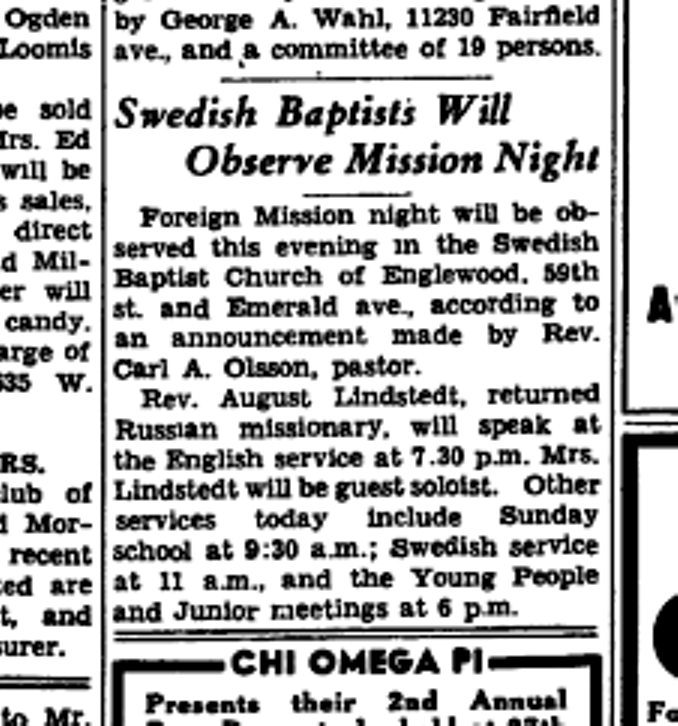 |
| Announcement of Rev. August Lindstedt upcoming talk. Mrs. Lindstedt was guest soloist. |
Missionary Life
The Clarion, Bethel College and Seminary's newspaper, in the February 1950 issue gave report of Rev. August Lindstedt's entrance into the the blessed rest of the Lord. Missionaries, in this case a husband and wife and their family, often live a hard life out of love for the work they do, and health is often compromised in the course of their efforts. This ends my brief account of how much can be learned from one small postcard with a Russian Greeting, a message written in Swedish, and sent to the Russian enclave in Harbin, Manchuria, in December of 1923.
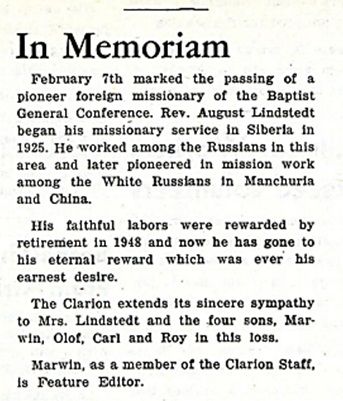
What a surprise to find an old postcard addressed to my grandfather August Lindstedt in Harbin China! My father is Rev. Marwin Lindstedt, the eldest of four sons of August and Margaret Lindstedt. The last son, Roy Lindstedt peacefully passed away 3/2025 while on a jet flying at 37,000 feet, so now all six of the core Lindstedt family members are together with Christ in heaven, and the rest of us still earthbound wait our turn.
ReplyDelete